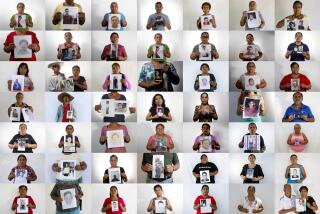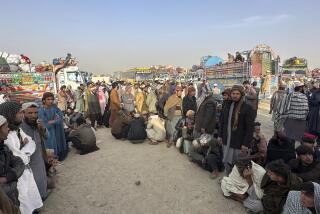Pakistanis seeks answers about hundreds of missing persons
- Share via
ISLAMABAD, PAKISTAN — One man vanished the morning of his wedding. Another disappeared on his way to a bus stop. Others also went missing: a poet, a mechanical engineer, a computer programmer, a homemaker.
Since the Sept. 11 attacks on the U.S., more than 400 Pakistanis have disappeared here, allegedly detained by the government and accused of being Islamic militants, the Human Rights Commission of Pakistan says. None has been charged with a crime. Few have called or written their families.
“I just want my husband,” said Amina Masood Janjua, whose spouse disappeared in 2005. “Even 20 minutes is a long time when you have lost your dear one. But 20 months have passed. I have yet to hear his voice. I have yet to know how this happened, how he is.”
Last fall, the Supreme Court took up the cases and the chief justice said the government needed to find the missing people, and quickly. In March, the issue gained renewed attention when President Pervez Musharraf suspended the chief justice, Ifitkhar Mohammed Chaudhry, sparking protests nationwide.
Although the government says Chaudhry abused the powers of his office, many Pakistanis believe he was removed because he was too outspoken, especially in this case, which underscores how difficult it is to hold accountable the country’s powerful military and intelligence agencies. It also highlights the complaints of human rights abuse that haunt Pakistan, a U.S. ally in its war on terrorism.
Some of the missing Pakistanis probably are Islamic militants or criminals. But critics allege that Pakistani authorities also have detained political opponents and critics under the guise of fighting terrorism. Lawyers representing the missing argue that all of them should be charged and tried in open court or released.
Pakistani officials deny detaining anyone unlawfully or knowing where most of the persons listed as missing, who include a few women, are. They say they may be with militant groups, even fighting in Afghanistan. A few of them have been tracked to the U.S. detention center in Guantanamo Bay, Cuba, the government says.
The U.S. State Department noted the disappearances in its annual human rights report, published in March. “There was an increase of politically motivated disappearances,” the report said. “Police and security forces held prisoners incommunicado and refused to provide information on their whereabouts, particularly in terrorism and national security cases.”
Pakistan’s attorney general has attended only one out of 10 hearings into the cases of the missing, despite being ordered several times to present the government’s side. At a recent hearing, the two-judge panel ordered the attorney general to appear after the morning break. He did not.
A deputy attorney general, Raja Muhammad Irshad, representing the government, chastised officials for not finding the missing. He said he was helpless.
“I’m a law officer of the federation but I’m a human being,” Irshad said, threatening to quit the case. “I have sentiment; I have feelings. When I see these people crying, I cannot tolerate it.”
In November, the chief justice ordered the government to find the 43 people identified as missing by Defense of Human Rights, a group led by Janjua. About half were quietly released over the following weeks. Some said they had been abused by intelligence agencies.
In a recent letter to the attorney general, the director of operations for the crisis management cell in the Interior Ministry, Lt. Col. Mohammed Imran Yaqoob, said the ministry had “made very hectic efforts” to find the missing people and that 33 of the 43 had been found.
Yaqoob also said that Janjua was being exploited. “There is no truth that her husband and also those mentioned in the list are held with intelligence agencies,” he wrote, adding that those still untraced are probably with militants.
Lawyers for the missing persons’ families say that most are nationalists, fighting for the rights of people in the provinces of Sindh and Balochistan, where a separatist movement has been gaining strength for more than a year. Government critics also have gone missing.
Mohammed Saleem Baloch, a Balochi nationalist, spoke to the media when he was released in December after nine months of detention. Within a week of his news conference, at which he criticized the government, he was detained again, human rights lawyers say.
Khalid Khawaja, who led Defense of Human Rights, which brought together Janjua and other families missing relatives, was arrested in February.
Every evening during rush hour, these families stand in front of the Supreme Court holding pictures of their relatives. They ride buses for hours to the hearings in Islamabad.
The little they know is largely through those who have been released. By interviewing those men, Janjua and lawyers have tracked 148 missing people whom the government said it could not find.
Janjua’s husband, now 45, disappeared July 30, 2005, on his way to catch a bus to Peshawar for a study group with Tablighi Jamaat, an Islamic movement that describes itself as a peaceful but is also suspected of being a potential breeding ground for militants.
Masood Ahmed Janjua was not violent and never talked about attacking the government or the West, his wife said. She says she has no idea what he is accused of or where he is.
If he comes home, he would probably not recognize his wife. Amina Masood Janjua used to a homemaker. Now, she runs her husband’s two technical colleges and his hospital. She also runs a support network for relatives of other missing persons and always searches for her husband.
Often when a detainee is released, he goes to see Janjua. And every time, her first question is the same: “Have you seen my husband?”
So far, no one has.
More to Read
Sign up for Essential California
The most important California stories and recommendations in your inbox every morning.
You may occasionally receive promotional content from the Los Angeles Times.













